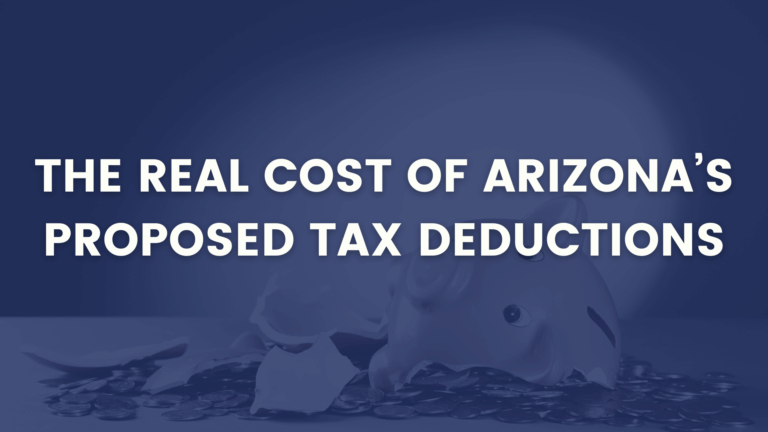
Using Increased Revenues from Conformity on More Tax Cuts is Fiscally Irresponsible
Two reports show that conforming Arizona’s tax code to the 2017 federal tax changes will result in a net increase to Arizona’s General Fund revenues in fiscal year 2020, although the two reports differed in the amount – the Joint Legislative Budget Committee estimates a $217 million net increase in state revenues while the Department of Revenue estimates a $236.2 million increase in state revenues.
Lawmakers should not direct these additional revenues toward tax cuts which could put our state in a real fiscal bind down the road. Arizona’s future economy will be stronger if lawmakers focus their response on ensuring our state is better prepared for the next recession or directing some of these additional revenues to our public schools and other underfunded priorities.
Arizona Should Use Increased Revenues to Prepare for Next Recession Instead of Giving Tax Cuts
While a recession does not appear imminent, the current economic expansion began in June 2009 and in July will become the longest economic expansion in American history at 121 months. Given this and the impossibility of predicting when the next recession will hit, Arizona should prepare for it. In a recent report, Pew Charitable Trusts found Arizona one of the least-prepared states for the next recession. Arizona’s rainy-day fund was created to substantially reduce, if not eliminate, the need for spending cuts or revenue enhancements during economic downturns. Spending reductions during recessions not only diminish the quality and quantity of public services at a time when many Arizonans are most in need of assistance, but also have a depressing effect on an already weak economy. At the end of FY18, the rainy-day fund was $194 million short of the level it was funded at in 2008. No deposit has been made to the fund since FY13. Depositing the additional revenue that would come from conforming to the federal tax changes into the rainy-day fund would be a wise way to prepare Arizona for the next recession.
Increased Revenue from Federal Tax Changes is Temporary but State Tax Cuts Would be Permanent
Many of the provisions in the 2017 federal tax changes which will lead to increased state revenues, like the elimination or reduction of itemized deductions and the expanded standard deduction, are temporary and will expire after 2025. This makes the idea of using temporary state revenue gains to pay for permanent state tax cuts risky because we do not know what will happen to state revenues when the temporary federal tax cuts go away. While it would only take a simple majority of the state legislature to enact tax cuts, the state constitution requires a two-thirds vote of the legislature to raise revenue or reverse a tax cut.
Dollars used for tax cuts are unavailable for education and other priorities
Arizona’s K-12 public schools, community colleges, and universities are all operating with less state funding per student today than a decade ago. State funding for affordable housing, childcare, and other investments which enable Arizona families to work and move up the economic ladder are also below 2008 funding levels. Arizona’s business leaders have consistently said that the lack of a skilled workforce is the biggest challenge to doing business in Arizona. Investing some of the increased revenues from conforming to the federal tax changes in these priorities will provide a far greater return on investment than another tax cut.
|
Understanding Conformity |
|
|
How could the federal tax cuts in 2017 result in Arizona GAINING revenue? |
Arizona stands to gain revenue from the federal tax changes because Arizona uses a taxpayer’s federal gross income and federal taxable income as the starting point for calculating how much state income taxes individuals and corporations owe. Because the 2017 federal tax changes eliminated or reduced many of the federal itemized deductions, and made other changes which cause a taxpayer’s taxable income to increase, if state lawmakers conform the Arizona tax code to these changes, it will cause some taxpayers to have a higher federal gross income or federal taxable income on their state returns, causing their state tax liability to increase. |
|
If the legislature conforms to the federal tax changes, will all Arizonans see an increase in their state income taxes? |
No. The vast majority of Arizonans will see no change in their state taxes if Arizona conforms to the federal tax changes:
|



